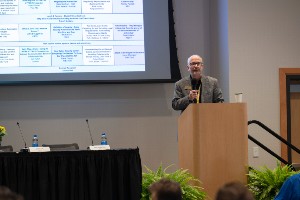
During his 28-plus years as a professor at Northern Kentucky University (NKU), Dr. Kevin Kirby, dean of the College of Informatics, has seen the genesis and meteoric rise of the cybersecurity program.
“Our first step was to offer a minor in digital forensics by partnering with the criminal justice program,” he said. “That morphed into offering cybersecurity courses in our undergraduate information technology major.
“Before you know it, we had a student cybersecurity team competing in regional and national Collegiate Cyber Defense Competitions. Previously, cybersecurity was just a track. Two years ago, we set it up as a bachelor’s degree. A year ago, we launched the online Master of Science (M.S.) in Cybersecurity program.”
That’s not all. NKU hosted the 15th annual Cybersecurity Symposium on Oct. 14, 2022. The event, presented by Cortex by Palo Alto Networks, has grown steadily since its inception.
Faculty members Dr. Yi Hu and Dr. James Walden were instrumental in the success of the annual symposium. Dr. Hu, director of the M.S. in Cybersecurity program, started the digital forensics program and coaches NKU’s cybersecurity team. Dr. Walden runs the Center for Information Security, which took the lead on the content of the symposium.
“It started small,” Dr. Kirby said. “The symposium was a joint effort with the office of information technology for NKU. Our chief information officer, Tim Ferguson, managed it together with faculty in computer science. Our CIO is very networked in the local IT community in the greater Cincinnati area.
“We brought in professionals year after year. It gradually grew. About five years in, the law school at NKU got involved. Cyber law is a big thing. There are always tracks in the symposium where lawyers can get continuing legal education credit.”
Growth and Success of Cybersecurity at NKU
Since NKU added cybersecurity as an area of study, the emphasis on the burgeoning career field has intensified, according to Dr. Kirby.
“As the curriculum expanded, we applied for and got a designation as a National Security Agency National Center of Academic Excellence in Cybersecurity,” he said. “Those aren’t as rare nowadays.
“The feds have an interest in students getting cybersecurity degrees, and this is one of the ways they do it. Cybersecurity changes every day. There’s a different threat every morning. The feds want to make sure our curriculum is up to date. There’s a rigorous review.”
The NKU cybersecurity team has reached the regional level for the last 14 years, including one trip to the nationals in 2014. NKU beat the Air Force Academy that year.
“They are teams of eight undergraduate students who, in real-time, are defending a corporate-style network that is under attack,” he said. “The judges are malicious hackers trying to take you down. You lock them in a room for 36 hours and have to keep systems up and running — real hardware, not simulations.”
The symposium is a bonus for NKU students, allowing them to expand their knowledge base without leaving campus. Each year it draws presentations from professionals and leaders in the field.
“It’s so valuable,” Dr. Kirby said. “It’s our bridge to the corporate world. It’s a large conference. Most people attending are information security officers from big companies and small companies around the metro area. We call it the North of Kentucky symposium because it draws heavily from Cincinnati.”
This year’s keynote speaker was security expert and private investigator Robert Siciliano, who has written five books and is CEO of Safr.Me.
“He was hilarious,” Dr. Kirby said. “People consider him one of the top speakers in the field. This year’s symposium was quite a success.”
Keeping Up With Cybersecurity Developments
Dr. Kirby has enjoyed seeing the cybersecurity symposium grow into a large event that attracts plenty of interest each October, which is also Cybersecurity Awareness Month.
“You need a refresher every year because the threat landscape changes so quickly,” he said. “Everyone will talk about data breaches in the last 12 months — new schemes by hackers, old schemes by hackers that still work. The investments that companies are making. The changes in threats by new technology, like AI. Legal and regulatory changes. It changes so fast.
“The vibe in the room is great. You have folks of all ages. You have classic vendor booths talking about what companies are doing, what they’re providing. For our students, it almost feels like a career fair. There’s a lot of networking.”
As cybersecurity continues to grow as a career field, Dr. Kirby said that student interest in it has also increased exponentially. He expects that trend to continue.
“A few years ago, you would think of cybersecurity as a branch of information technology — people configuring firewalls and monitoring network traffic for intruders,” he said. “Now, it is so much more sophisticated and richer than that.
“It’s like you’re an intelligence analyst trying to stay ahead of the game. There is a lot of strategy, not just tactics. There’s corporate organizational communication. There’s dealing with end users and employees, human resources, legal and regulation.”
Now in his 29th year at NKU, Dr. Kirby remains excited and enthusiastic to be a part of the future of the cybersecurity program and symposium.
“I’m looking forward to No. 16 next year,” he said. “It’s so much fun. It’s one of two big symposiums by our Informatics Plus. Every spring, we do a digital transformation symposium; this will be year three.”
Learn more about NKU’s online Master of Science in Cybersecurity program.